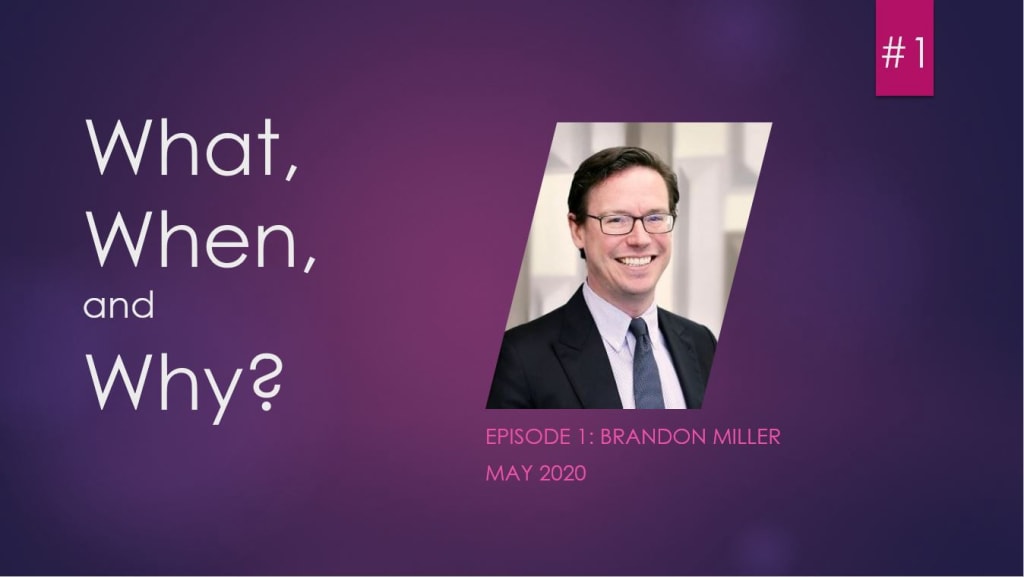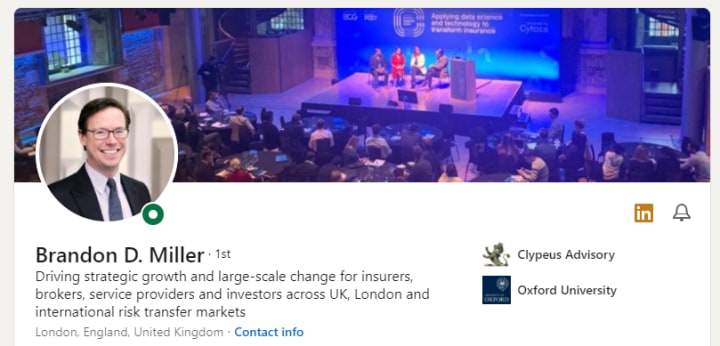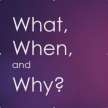Brandon Miller
“Study what you enjoy even if you’re not sure whether it will be useful”

Brandon had a great education. He studied “Comparative Literature” at Princeton University and then “Classical Chinese” at Oxford University. Until recently he worked at Boston Consulting Group, where he helped a wide range of insurance companies make better decisions about how to run their businesses. He is now an “independent consultant,” still working on the same kind of projects that advise insurance companies on how to improve their businesses, but is self-employed, rather than being employed by a large company.
Brandon decided he would study subjects at school and then university which he found interesting, rather than choosing a course of study that presented a clear path to a particular job. He believed that being clever and broadly educated in the liberal arts would allow him to compete with peers who had studied subjects with more obvious connections with the professional skills that would be expected of someone in the working world. He believes that pursuing his personal interests did not hurt his ability to find a job.
As a teenager, he acknowledges he had no idea what he wanted to do after university, and so making subject choices at 15 or 16 would have reduced the breadth of his horizons; in that case, keeping things broad seemed a sensible option.
1. Please tell us a bit about who you are and the jobs you have done.
Until recently I was a partner at a consulting firm called The Boston Consulting Group (BCG) in London. BCG works with companies in many industries; I was focused on insurance. My job was to help insurance companies make better decision and generally run better as companies.
Now I do the same but as an “independent consultant”. This has the potential to allow me more control over the types of companies and projects I work on — it’s theoretically more flexible — but, without the support structures of a big company, it means I must myself find new projects — otherwise I don’t get paid.
Before BCG I studied Classics and Comparative Literature as an undergraduate in America. Then I went to Oxford to do a PhD. I studied Classical Chinese and wrote about the development of the book in early China… which had absolutely nothing whatsoever to do with insurance!
2. How many jobs have you done?
Well, when we first met in 2020 I had only ever worked at BCG. I guess you would say I’m now in my second job, though the work is very similar to BCG, just that I’m working for myself.
I spent 13 or 14 years at BCG. It was the first thing I did after my PhD. I was older than most people when I got my first job as I took a very long time working on my dissertation.
3. To do your job what skills are required?
Consulting requires the ability to think closely and carefully through a problem. In the abstract, this is what any student of the liberal arts is trained in at university. A consultant must be able to identify, conceptualise and describe a problem. It’s what you do in writing an essay or doing research, like in a PhD.
But general cleverness isn’t enough: You need to understand the industry you’re working in. This is one of the biggest challenges in consulting, particularly because, as a young 20- or less young 30-year-old, you will be helping people with far more experience find ways to do their jobs differently and — we hope — better. At least having some interest in the topic makes the work more enjoyable and makes it easier to engage with your clients.
I also just enjoy insurance. It is often not considered an exciting industry. But as with most things, as one gets deeper into its complexities, it reveals greater interests and challenges.
`By the way, how consulting typically works is that when people join from university and early in their career, they work on many different types of challenges in many different industries. But many choose to focus on building expertise in a specific topic, which can make you more helpful to clients.
4. How has what you studied helped?
As I mentioned: There was nothing in any book I read or essay I wrote that was specifically or directly relevant.
But I think that’s great. I often think how sad it would be if someone spent years at university doing a law degree as an undergraduate, realised he hated the law but felt obliged to become a lawyer rather than considering other options. That said, very few people get paid to do what they love — certainly not when they’re starting out — and that includes me.
If you study something like the development of the book in early China you know that you’ll never be able to earn a living from the facts you’ve accumulated. So if you’ve acknowledged that you’ve chosen interest or passion over hard-nosed professional preparation, you’re able to — or, better, you should — decide how to start your working life based on a different, broader set of experiences, when you are (one hopes) more mature.
5. What was your favourite subjects at school
English. Or maybe Classics. Or Greek. I liked difficult, “intellectual”, pretty nerdy subjects that required some investment in the cost of entry before you could engage. That’s very nerdy.
I went to an American university with a “core curriculum” — where everyone must take a range of courses from maths to English to the sciences. I took a lot of classes — ¾ of them actually — that were outside my “major” subject. They made me think in a different way. They pushed me into a different frame of thought — it was a useful thing, and they taught me how to apply critical thinking to unfamiliar topics. This ability to apply something you have done before to a new situation is useful in many places in life, and certainly in a consulting job
6. Is there any regret about the subjects you chose to drop as you progressed through school?
Sometimes I wish I had had the ability and the mindset to have studied theoretical physics and had done some way-out topic like string theory or quantum mechanics. I have a sufficient knowledge of basic science but I would have loved to go into theoretical maths or physics.
But only recently have I thought that a clever person — even one studying a pre-professional degree — law or economics (but probably not medicine — I had no aptitude there!) — would be able to find interest and stimulation in the subject, with the benefit that his parents could have more confidently talked about his interests at dinner parties.
7. As you think about you career or life what advice would you give to the 16-year-old you?
I’d be tempted to say don’t go to graduate school*. In some ways I stayed as it was simply the path of least resistance. That was fine to a point but I stayed until I was 30 so that made me very old, relatively (and, if I’m honest, not so relatively!) speaking, as I went for my first job.
I could have gone to an investment bank in 2001. In that type of role back then, one worked awfully hard and could earn a huge amount. If I had done that route I would either be dead with a heart attack or already retired! Either way, I wouldn’t be working any more… and it just might have been rather boring.
*Grad school = university course(s) you study after your undergraduate degree.
8. What’s you LinkedIn tag line and what does it actually mean?

“Driving strategic growth and large-scale change for insurers, brokers, service providers and investors across UK, London and international risk transfer markets.”
My tagline is quite wordy — it still needs work — but I hope it gives some sense of what I can do for clients.
- “Strategic growth” is about major decisions a company needs to make to grow, not just selling a little bit more of the same thing.
- Similarly “large-scale change” means I want to help on the small number of projects that make big changes rather than the hundreds of small change projects that companies do every year. Some people prefer doing lots of small change projects; I prefer focusing on the larger ones. One of the joys of working in London is there is such a broad range of work that often one can choose where to go.
- I then list the clients I work with. Insurers are companies that reduce the impact of certain negative events by promising to compensate their clients with money when some bad thing happens. ; brokers are companies that help their clients find the right insurance at the right price.
- Service providers is a term for companies that support insurers and brokers. These might be IT firms or lawyers or companies that supply data. Investors are the firms, families or individuals who trade their money for a share in the ownership of another company
- “Risk transfer” is the broader category to which an insurer’s activities belong; one party “transfers” or pays to offload a risk to another party that may be better at handling it
- As I enjoying working internationally, and because some of the most interesting and complex challenges involve international business, I clearly state that I’m not just working in London. In fact some of my most interesting work currently relates to companies in Asia.
See the full list of What, When & Why interviews here.
About the Creator
What, When, & Why
As I think about what I might want to do as a job and what are the right exam and university choices I have realised it is really useful speaking to people about their person experiences. This is the result.






Comments
There are no comments for this story
Be the first to respond and start the conversation.